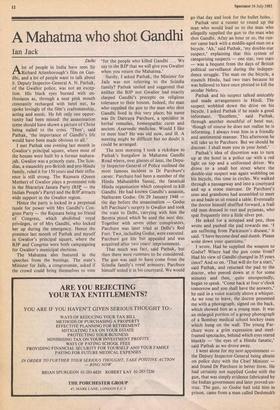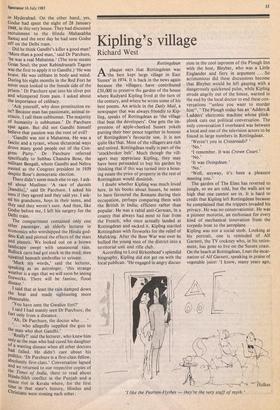A Mahatma who shot Gandhi
Ian Jack
Delhi
Alot of people in India have seen Sir Richard Attenborough's film on Gan- dhi, and a lot of people want to talk about it. Deputy Inspector-General A. N. Pathak, of the Gwalior police, was not an excep- tion. His black eyes burned with en- thusiasm as, through a neat pink mouth constantly recharged with betel nut, he spoke lovingly of the film's craftsmanship, acting and music. He felt only one oppor- tunity had been missed: the assassination scene should have shown a picture of Christ being nailed to the cross. 'Then', said Pathak, 'the importance of Gandhi's life would have been made obvious to all.'
I met Pathak one evening last month in Gwalior's principal square, where most of the houses were built by a former mahara- jah. Gwalior was a princely state. The Scin- dias, a staunchly pro-British and pro-Hindu family, ruled it for 150 years and their influ- ence is still strong. The Rajmata (Queen Mother) of Gwalior plays a prominent role in the Sharatiya Janata Party (BJI: — the Indian People's Party) and the BJP attracts wide support in the Gwalior region.
Hence the party is locked in a perpetual tussle for power with Mrs Gandhi's Con- gress Party — the Rajmata being no friend of Congress, which abolished royal privileges, or of Mrs Gandhi, who locked her up during the emergency. Hence the presence last month of Pathak and myself in Gwalior's principal square, where the BJP and Congress were both campaigning for Gwalior's municipal elections.
The Mahatma also featured in the speeches from the hustings. The state's Minister for Jails, a congressman, asked if the crowd could bring themselves to vote 'for the people who killed Gandhi ... We say to the BJP that we will give you Gwalior when you return the Mahatma.'
Surely, I asked Pathak, the Minister for Jails was not referring to the Scindia family? Pathak smiled and suggested that neither the BJP nor Gwalior had exactly clasped Gandhi's precepts on religious tolerance to their bosom. Indeed, the man who supplied the gun to the man who shot Gandhi lived in this very place; his name was Dr Dattraya Parchure, a specialist in herbal remedies, homeopathic cures and ancient Ayurvedic medicine. Would I like to meet him? He was old now, and ill. A meeting might be difficult but no doubt it could be arranged.
The next morning I took a rickshaw to Pathak's bungalow in Mahatma Gandhi Road where, over glasses of lassi, the Depu- ty Inspector-General of Police outlined the most famous incident in Dr Parchure's career. Parchure had been a member of the Hindu Mahasabha Samaj, the fanatical Hindu organisation which conspired to kill Gandhi. He had known Gandhi's assassin, Nathuram Godse. On 29 January 1948 — the day before the assassination — Godse left Parchure's surgery in Gwalior and took the train to Delhi, carrying with him the Beretta pistol which he used the next day. Together with seven other conspirators, Parchure was later tried at Delhi's Red Fort. Two, including Godse, were executed. Parchure got life but appealed and was acquitted after two years' imprisonment.
That much was fact, said Pathak, but then there were rumours to be considered. The gun was said to have come from the Scindia family's royal armoury; Parchure himself tested it in his courtyard. We would go that day and look for the bullet holes.
Pathak sent a runner to round up the man who would lead us to the man who allegedly supplied the gun to the man who shot Gandhi. After an hour or so, the run- ner came back with a middle-aged man on a bicycle. `Ah,' said Pathak, 'my double-star suspect,' explaining that this system of categorising suspects — one star, two stars — was a bequest from the days of British political surveillance during the indepen- dence struggle. The man on the bicycle, a staunch Hindu, had two stars because he was believed to have once plotted to kill the secular Nehru.
Pathak and his suspect talked amicably and made arrangements in Hindi. The suspect wobbled down the drive on his bicycle. I asked Pathak if he made a good informant. 'Excellent,' said Pathak, through another mouthful of betel nut, 'though of course he does not realise he is informing. I always treat him in a friendly and sentimental manner. This afternoon he will take us to Parchure. But we should be discreet. I shall meet you in your hotel.'
Pathak's idea of discretion was to turn up at the hotel in a police car with a red light on top and a uniformed driver. We drove to a small hot street where the double-star suspect was again wobbling on his bicycle, this time in circles. We walked through a passageway and into a courtyard and up a stone staircase. Dr Parchure's sons and grandsons had assembled to meet us and bade us sit round a table. Eventually the doctor himself shuffled forward, a frail old man dressed in vest and pyjamas, who spat frequently into a little silver pot.
He asked for a notepad and pen, then wrote and pushed the pad towards me. 'I am suffering from Parkinson's disease,' it said. 'I have become deaf and dumb. Please write down your questions.'
I wrote. Had he supplied the weapon to Godse? Where had the gun come from? Had his view of Gandhi changed in 35 years since? And so on. 'That will do for a start,' said Pathak, and returned the pad to the doctor, who peered down at it for some minutes and then, quite unexpectedly, began to speak. 'Come back at four o'clock tomorrow and you shall have the answers,' he said in a voice scarcely above a whisper. As we rose to leave, the doctor presented me with a photograph, signed on the back, which showed him as a young man. It was an enlarged portion of a group photograph of a Bombay medical school hockey team which hung on the wall. The young Par- chure wore a grim expression and steel- framed spectacles, behind which eyes stared blankly — 'the eyes of a Hindu fanatic,' said Pathak as we drove away.
I went alone for my next appointment — the Deputy Inspector-General being absent on police duty with the Chief Minister — and found Dr Parchure in better form. He had certainly not supplied Godse with the gun, that was simply evidence fabricated by the Indian government and later proved un- true. The gun, so Godse had told him in prison, came from a man called Deshmukh
in Hyderabad. On the other hand, yes, Godse had spent the night of 28 January 1948, in this very house. They had discussed recruitment to the Hindu Mahasabha Samaj and the next day he had seen Godse off on the Delhi train.
Did he think Gandhi's killer a good man? 'More than a good man,' said Dr Parchure, 'he was a real Mahatma.' (The term means Great Soul; the poet Rabindranath Tagore was the first to apply it to Gandhi.) 'He was brave. He was celibate in body and mind. During his eight months in the Red Fort he never once looked to the female side of the Prison.' Dr Parchure spat into his silver pot and whimpered from pain. I asked about the importance of celibacy.
'Ask yourself, why does prostitution ex- ist? Because man has passionate, animal in- stincts. I call them subhuman. The majority Of humanity is subhuman.' Dr Parchure spat again. But did not Gandhi himself believe that passion was the root of evil?
'Gandhi was not a Mahatma. He was a fascist and a tyrant, whose dictatorial ways drove many good people out of the Con- gress Party.' Dr Parchure referred specifically to Subhas Chandra Bose, the militant Bengali, whom Gandhi and Nehru ousted as the Congress president in 1939 despite Bose's democratic election.
There didn't seem much else to say. I ask- ed about Muslims: 'A race of dacoits [bandits],' said Dr Parchure. I asked his sons if they agreed and they said yes. I ask- ed his grandsons, boys in their teens, and they said they weren't sure. And then, like Godse before me, I left his surgery for the Delhi train.
The compartment contained only one Other passenger, an elderly lecturer in economics who worshipped the Hindu god- dess Kali and plotted the effects of the stars and planets. We looked out on a brown landscape swept with unseasonal rain. Bullock carts had got stuck in the mud; men squatted beneath umbrellas to urinate.
'Mark my words,' said the lecturer, sPeaking as an astrologer, 'this strange Weather is a sign that we will soon be seeing fireworks. There will be famine, flood disease.'
1 said that at least the rain damped down the heat and made sightseeing more Pleasurable.
'You have seen the Gwalior fort?'
I said I had mainly seen Dr Parchure, the fort only from a distance.
`Ah, Dr Parchure, the doctor who ... who allegedly supplied the gun to the man who shot Gandhi.'
'Really?' said the lecturer, who knew him °illy as the man who had cured his daughter °f a wasting disease when all other doctors had failed. He didn't care about his Politics. 'Dr Parchure is a first-class fellow, absolutely first-class.' Conversation lapsed and we returned to our respective copies of
the Tunes of India, there to read about
ti!ndu-Sikh conflict in the Punjab and a Inor riot in Kerala where, for the first tune in that state's history, Hindus and Christians were stoning each other.







































 Previous page
Previous page